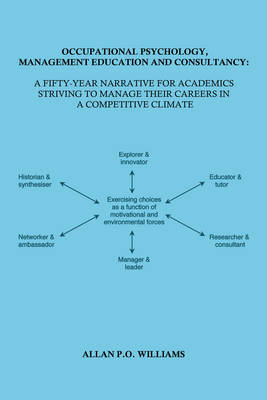In the process of shaping a successful career for themselves academics have to build on the experiences of others. Competition for jobs and promotion is increasing as we find ourselves coping with an equal opportunity and international market. This book describes the career of an academic who has been active in three interrelated disciplines: occupational psychology, management education and consultancy. His career has coincided with the early development of all three areas in the UK. The purpose of this narrative is not to test hypotheses derived from the literature, but to encourage others to adopt a new mental framework when thinking about managing their own careers. An individual's career conveys the extent to which he or she has managed to master the challenges faced by a changing and uncertain world. Our accumulated learning experiences affect our self-concept and our career choices. A theoretical model is put forward to convey the dynamic processes involved in this process. This model consists of six pairs of roles: explorer/innovator; educator/tutor; researcher/consultant; manager/leader; networker/ambassador; historian/synthesiser.Exercising choices as a function of motivational and environmental forces is at the core of the model.
A chapter is devoted to each pair of roles. Explorer/innovator deals with the early career decisions when uncertainty is great. The next four chapters deal with the dominant roles played in the chosen academic career. This is the 'meat' of the career and covers the events that eventually determine the degree of success experienced by the individual. Each chapter refers to a number of publications by the author and colleagues; the reasoning here is to reduce the chapter length without depriving the reader the opportunity of gathering more detailed information. The final chapter, historian/synthesizer, tries to make sense of the career as a whole, including researching the four organisational histories undertaken in retirement. Finally, the narrative concludes by posing two questions: What have I learnt as a result of reviewing my academic career? What useful lessons can others learn from my experiences? A point made in relation to the former is the value of team-based as opposed to individual-based research projects.One of several observations made in relation to the latter question is the value of adopting a strategic approach (including regular reviews) when managing one's own career
- ISBN10 0995462011
- ISBN13 9780995462014
- Publish Date 15 June 2016 (first published 27 May 2016)
- Publish Status Active
- Publish Country GB
- Imprint Allan P O Williams
- Format Hardcover
- Pages 121
- Language English
